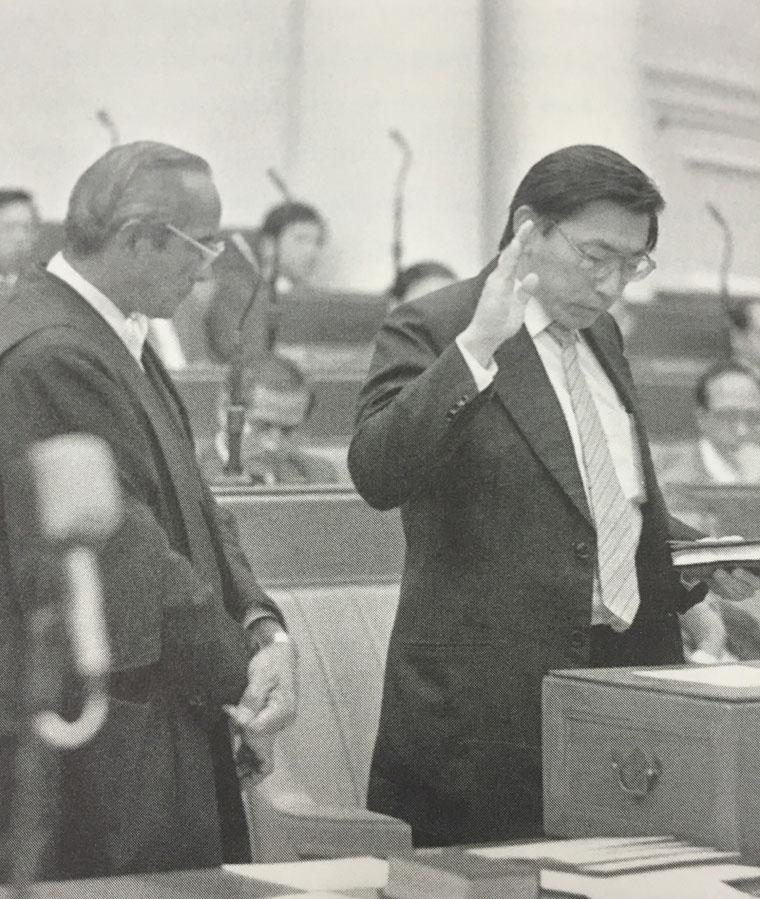In opposition politics today, you'll most likely think of figures like Workers' Party leaders Low Thia Khiang and Sylvia Lim, and perhaps also Singapore Democratic Party chief Chee Soon Juan.
If you weren't really paying attention to politics in your growing-up years, you might only know vaguely of Chiam See Tong as the longest-serving Opposition MP, who was at the helm of Potong Pasir SMC for 27 years between 1984 and 2011, when he left to contest Bishan-Toa Payoh GRC and lost.
We've told you before a bit about the epic life he's led up till now, so we thought, for his 85th birthday on March 12, we would share the meaningful maiden speech he made in his first term in Parliament.
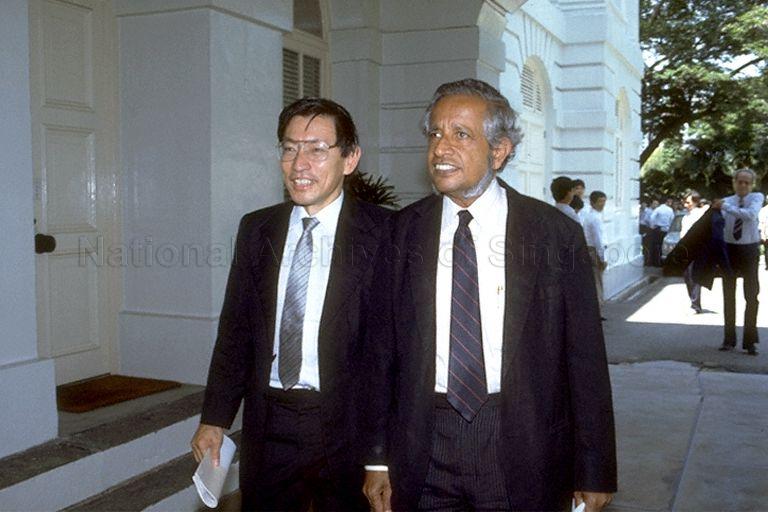 Opposition Member of Parliament (Potong Pasir ) Chiam See Tong (left) and Member of Parliament (Anson) J B Jeyaretnam (right) arriving for the opening of the sixth parliament on February 25, 1985. (Source: National Archives of Singapore)
Opposition Member of Parliament (Potong Pasir ) Chiam See Tong (left) and Member of Parliament (Anson) J B Jeyaretnam (right) arriving for the opening of the sixth parliament on February 25, 1985. (Source: National Archives of Singapore)
This dates back to 32 years ago, on March 4, 1985, when he was already 50 years old, in the sixth Parliament's debate on the presidential address. You can search online for Chiam's name to find his speech. It's long, but no less worth reading, and we share their key points with you here:
1. He made some historic observations about the state of Parliament in Singapore then.
For the first time, there were three female MPs, after 15 years of not having any.
For the first time, too, there were three represented political parties, too — the PAP, the Workers' Party (J.B. Jeyaretnam's party, and Jeyaretnam was elected to the Anson ward in a 1981 by-election, and again in GE 1984. He lost his seat in 1986.), and the Singapore Democratic Party (Chiam's party).
"Now we have got a three-party Parliament. This is significant. The government is not short of feedback machinery. We have got the backbenchers for a start, meet-the-people sessions, RCs (Residents' Committees), CCMCs (Community Club Management Committees), the lot, and yet the people want an extra voice in Parliament. They want an Opposition in Parliament because they know that it is through the Opposition that they can be effectively heard."
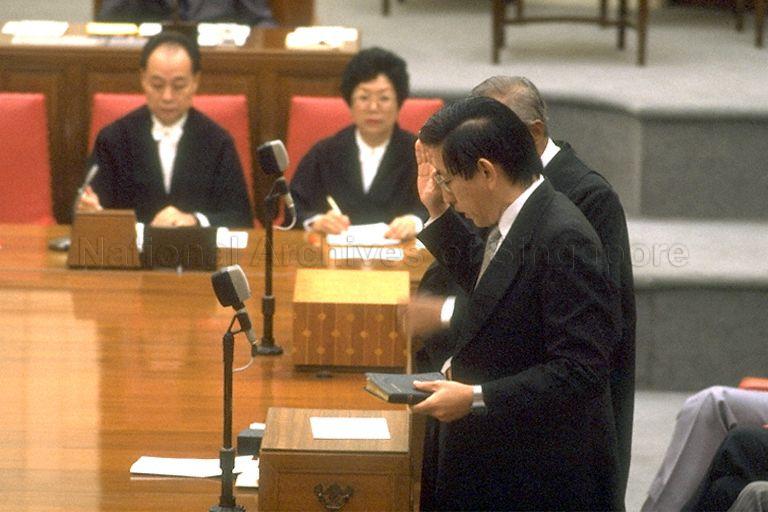 Swearing-in of Members of Parliament (MP) at opening session of the sixth Parliament - picture shows Opposition MP for Potong Pasir Chiam See Tong taking oath of allegiance. (Source: National Archives of Singapore)
Swearing-in of Members of Parliament (MP) at opening session of the sixth Parliament - picture shows Opposition MP for Potong Pasir Chiam See Tong taking oath of allegiance. (Source: National Archives of Singapore)
2. He states what his job is as an Opposition parliamentarian in simple and clear terms.
"I shall be a loyal Opposition, loyal to the Constitution, loyal to the nation, but not loyal to the ruling Party. My role in Parliament is to contribute to nation building. We are a very young country and we have much to do in terms of nation building. Nation building must not be the sole concern of the ruling Party. The Opposition is equally responsible in nation building. In fact, the whole nation must be responsible for that also. If we are to improve on what has already been built, we should also improve on our Parliamentary system. On my part, I shall try my best to ensure that the Opposition be institutionalised in Parliament.
My task is to ensure that it is not just an Opposition but it is an Opposition which must be constructive and sincere. Such an Opposition shall also be responsible for the preservation of our multi-racial, multi-lingual, multi-cultural, multi-religious and our tolerant way of life. As an Opposition, I shall also preserve and protect the sovereignty and integrity of our nation, and support a strong defence force within our economic limits for such a purpose."
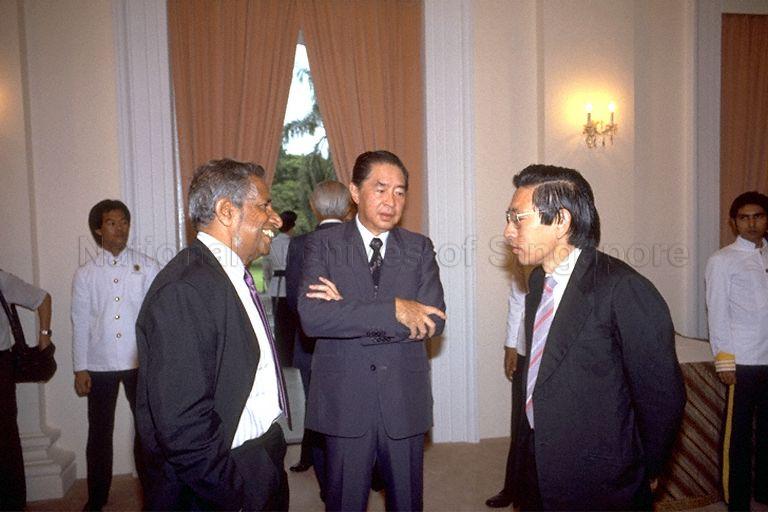 Swearing-in of Prime Minister and Cabinet Ministers at the Istana - Picture shows Speaker of Parliament Dr Yeoh Ghim Seng (centre) with Opposition party Members of Parliament for Anson J B Jeyaretnam (left) and for Potong Pasir Chiam See Tong at the reception in January 1985. (Source: National Archives of Singapore)
Swearing-in of Prime Minister and Cabinet Ministers at the Istana - Picture shows Speaker of Parliament Dr Yeoh Ghim Seng (centre) with Opposition party Members of Parliament for Anson J B Jeyaretnam (left) and for Potong Pasir Chiam See Tong at the reception in January 1985. (Source: National Archives of Singapore)
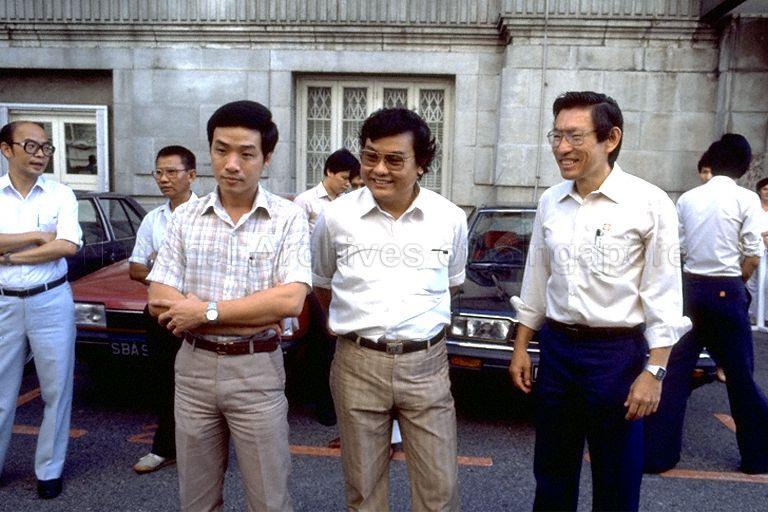 Burning of Ballot Papers - Mr Low Thia Khiang (third from left) and Mr Chiam See Tong, MP for Potong Pasir (right) in June 1985. (Source: National Archives of Singapore)
Burning of Ballot Papers - Mr Low Thia Khiang (third from left) and Mr Chiam See Tong, MP for Potong Pasir (right) in June 1985. (Source: National Archives of Singapore)
And try, he did — Chiam would go on to "institutionalise" himself in Parliament for a full 27 years, together with his WP counterpart, Low Thia Khiang, who entered later in 1991 and remains elected with his fellow Aljunied GRC WP MPs today.
3. He made a case for democracy, weaving wealth creation and resilience into his argument.
- First, he talked about democracy and its importance, at a time when many in the ruling party laughed at him:
"I believe in democracy. I believe in democracy not just for the sake of democracy. At one election I remember, my opponent, who was at that time in the Government, said that we were here so busy building a country, and asked, 'Why was this Mr Chiam running about and talking about democracy?' We do not just want democracy in an academic sense. We believe in democracy because we believe that it is the best system in which we can establish a creative and vibrant society, because it is under this system that the fullest creative and innovative talents can come to fruition."
- He then presciently spoke about the real wealth Singaporeans need to create — through innovation and creativity that we can export to the world.
"What is the real source of wealth? Real source of wealth is from creative labour. We must go down to the basics. That is the real source of wealth. Many people in Singapore have bought land in a rising market. They bought land for $1 million, and then three months later they sold it for $2 million. They have made $1 million, and they become rich men. Others have speculated in the share market - bought low, sold high. They have also become rich. Yes, there are many rich men in Singapore from that source of business activity. But they have not created wealth for Singapore. Real wealth is what we can make. I have read somewhere that a university lecturer has successfully grown some mushrooms. Now this is really creating something. He exports them; we really earn the money."
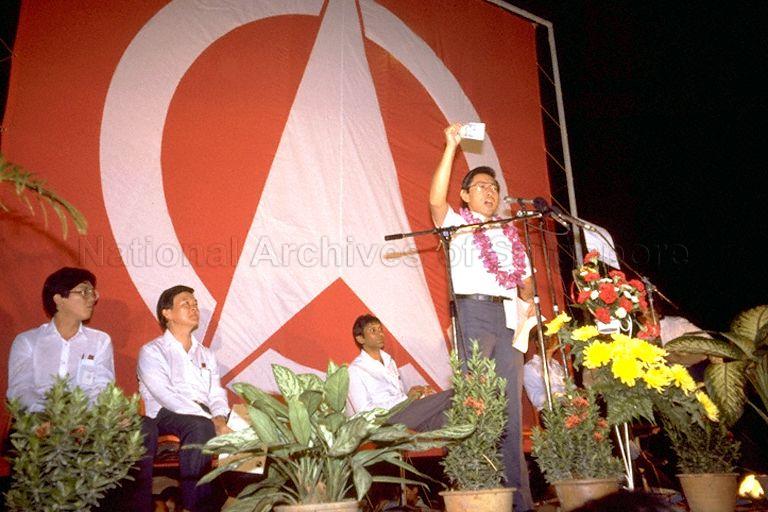 Singapore Democratic Party (SDP) candidate for Potong Pasir Constituency Chiam See Tong speaking at SDP rally for General Election 1984 at Potong Pasir Constituency, at the junction of Potong Pasir Avenues 1 and 2.(Source: National Archives of Singapore)
Singapore Democratic Party (SDP) candidate for Potong Pasir Constituency Chiam See Tong speaking at SDP rally for General Election 1984 at Potong Pasir Constituency, at the junction of Potong Pasir Avenues 1 and 2.(Source: National Archives of Singapore)
- Here's how he rounded it up:
"We want democracy because we feel that it is the best system for the creation of wealth. Democracy not just for the sake of democracy. In fact, it is a pre-condition for the Government if they want to fulfil their vision in 1999 and to have a more creative and vibrant society. You may say that Singapore can sell services. Yes, we can sell services. We are good at it, can make money. But what happens if there is a world recession and then we have to ('Rear chickens!' cries then-minister S Dhanabalan, which presumably triggers laughter among the PAP benchers. Chiam was during the hustings laughed at by the PAP leaders for talking about rearing chickens)...
Yes, all the younger Ministers have no such experience and they can laugh. Nothing like personal experience. Personal experience can never be transferred to another generation unless they have undergone that experience.
As I was saying, you do not create real wealth just by selling your services, If the world recession really digs deep into Singapore, then it would be difficult for the Government to carry out its programme. As it is, there is some recession. The Government was unable to sell the parcels of land at Marina South. They have to dig into the national assets to finance the MRT projects. Think how wonderful it would have been if we have the creative talents and expertise to build the MRT ourselves."
Not bad.
4. He digs deep and points out the curious issue of the RC, and the fact that he is disallowed from being Advisor to it, or to the CCMC:
"I take a point which concerns my constituency. The people of Potong Pasir have cast nearly 60% of their votes to vote me to represent them. It is obvious that they believe in me. They think I am an honourable man, honest and trustworthy, otherwise they would not have cast about 60% of their votes. If I get just 50.1%, there might be a doubt. But I have got a clear-cut majority. They want me to represent them in that constituency, but the Government says, 'No. You have to wait for another year before you can be appointed as Advisor to the Residents' Committee. We do not want you to be in the community centre's Management Committee.' Where is the credibility of the Government? The people want me to represent them and the Government says no. How are you going to get their cooperation?"
5. He even asked about CPF, decades before Roy Ngerng showed up:
"Now, about the senior citizens. I note that now senior citizens are defined as people who are 65 years of age. I have the understanding that, in fact, senior citizens are people who are over 55 years of age, and not 65. Is this in preparation, setting people's mind in readiness, for the extension of the withdrawal of the CPF from 55 to 65? Further, if the credibility of the government is to be maintained, then it has to do something about the CPF. The government has promised to return the CPF money to workers at age 55. Now it says that it is not going to return this money until they reach 60 or 65. The policy now is that it has been postponed for two years, Well, the people go along with the government, they will wait for two years. But at the end of two years, is the government still going to tell the people, 'Yes, at the end of these two years, we are going to return you the money', or is it not? They have to make a stand. On this one stand alone, if the government cannot come up with a clear-cut answer, then I am afraid it is going to be very difficult for the people to believe the government."
We're still on the same speech, by the way. Chiam goes on to speak up for motorists about traffic flow, taxi drivers on diesel taxes — even taking the effort to share the breakdown of calculations of their losses.
This triggered Minister Dhanabalan to shout "You are wrong in your calculation!" and later, when Chiam said his calculations were based on a Sunday Times report, Minister for the Environment Ahmad Mattar retorted "The Sunday Times is wrong!"
He also touches on education, cautioning against the social implications of streaming students in the third and sixth years of primary school, proposing the scrapping of both and the implementation of an eight-year programme instead.
And he even spoke up for sports, voicing his hope that it can be defined as part of our culture.
You can read Chiam's full speech here. You can jump to the second mention of his name.
Happy 85th birthday, Mr Chiam.
By the way, he was in the news this week:
Chiam See Tong is so passionate about sports that he launched a sports foundation for youth
Top photo from Rise of the Strawberry Nation
If you like what you read, follow us on Facebook and Twitter to get the latest updates.
If you like what you read, follow us on Facebook, Instagram, Twitter and Telegram to get the latest updates.
